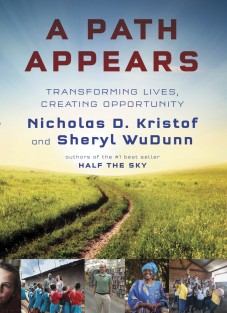There is little doubt that any educator would have responded in the same way. Upon reading the following sentence in a New York Times book review, one’s curiosity is piqued and one wants to know more: “In the wrong hands, A Path Appears is a dangerous book: you wouldn’t want to leave it lying around where your teenager might glance at it.”*
Image from the documentary A Path Appears.
Hmmm, I thought to myself, and perused on. “Nicholas D. Kristof and Sheryl WuDunn [the authors of the work in question] show you,” writes the reviewer, Oxford economist Paul Collier, “through many amazing vignettes matched with serious evidence, that you can make a difference in the lives of people trapped in misery.” Wait, how might such a message be dangerous for teenagers, I wondered? I had no choice but to purchase a copy of A Path Appears for myself.
I also asked some of our teen-aged students what they thought about Professor’s Collier’s reference to their generation. Showing them the tome and opening it up to a passage which summarizes well Kristof’s and WuDann’s argument, I inquired as to why the reviewer might have described A Path Appears as being so potentially hazardous for young people. “The challenge [for today]”, I read aloud, “is to nurture a culture of altruism and empathy, seeking to imbue an instinct for social engagement. That is to say, it’s not you or me, but we.”** Or consider this section: “Participating in a cause larger than yourself builds up our social networks, creates a sense of fulfillment, gets us out of bed in the morning with a bounce in our step, and helps us make a difference in the lives of others-even as it affirms a purpose for our own lives on earth.”*** Explosive for the young? In what way?
“Selfie Generation?”
The writer’s being ironic, replied one high schooler. For this student, Paul Collier was trying to remind adults that they too had once been idealistic and should think like teenagers again if they truly cared about the world. Yes, interjected another, arguing that all of the problems facing the globe come from older generations who need to know that resignation is not an option. A third student added that Professor Collier might actually be criticizing young people, because they are often called the “selfie generation”. Maybe the provocation is meant for us, she continued. The writer’s saying that if we don’t pay attention, we teenagers might grow up forgetting about those less privileged than ourselves, but that’ll never happen. Never, her peers agreed, citing service projects in which each was personally engaged. Just because we like technology doesn’t mean much, they added; in fact, social media are VERY good tools for bringing about change.
Bravo, I happily enjoined. You students are so committed to making a difference that I knew you would have great insight. What do you think, should we request that our library order A Path Appears for the LFNY? One of the students to whom I had handed the book answered with a citation from page three. Listen to this, he said. A quote from Henry David Thoreau: “It is not enough to be industrious; so are the ants. What are you industrious about?” Sounds like the question we’re asking you to answer during your years at the Lycée Français de New York, would you agree? Yes, came their reply. And a copy for our CDI we should have!
*Paul Collier, “A Path Appears by Nicolas Kristof and Sheryl WuDunn”, New York Times, October 16, 2014.
**Nicolas D. Kristof and Sheryl WuDunn, A Path Appears (New York: Alfred Knopf, 2014), p. 15.
*** Ibid, p. 315.
About the Author :
Sean Lynch was Head of School at the Lycée Français de New York from 2011 to 2018, after having spent 15 years at another French bilingual school outside of Paris: the Lycée International de St. Germain-en-Laye. Holding both French and American nationalities, educated in France (Sciences Po Paris) and the United States (Yale), and as the proud husband of a French-American spouse and father of two French-American daughters, Sean Lynch has spent his entire professional and personal life at the junction between the languages, cultures and educational systems of France and the United States. In addition to being passionate about education, he loves everything related to the mountains, particularly the Parc National du Mercantour.



